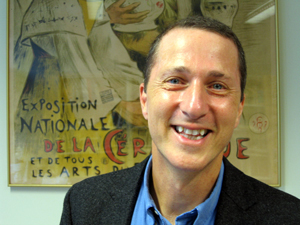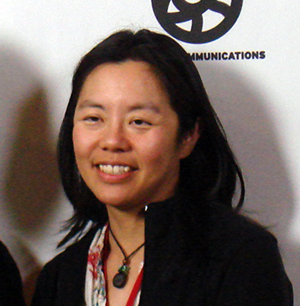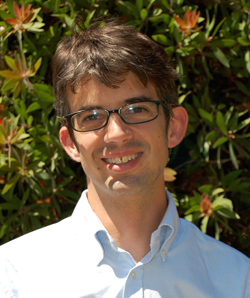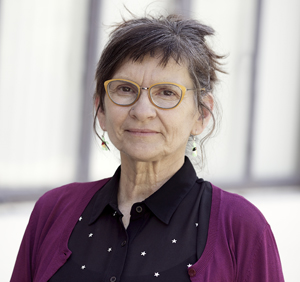Campus News
LASER talk to explore research in environmental art, recycling, ocean medicines, and film
UC Santa Cruz’s Institute of the Arts and Sciences will present its final LASER talk of the academic year on campus this spring on Tuesday, May 19, at 7 p.m. in the Digital Arts Research Center.





UC Santa Cruz’s Institute of the Arts and Sciences will present its final LASER talk of the academic year on campus this spring on Tuesday, May 19, at 7 p.m. in the Digital Arts Research Center.
The event will include presentations by two UC Santa Cruz professors–Daniel Press (“What is Recycling Good For? The Case of American Paper Today”) and Roger Linington (“Where Do Medicines Come From? In Search of Therapeutics From the World’s Oceans”).
It will also feature guest artist-activist Kim Abeles ( ”frugalworld.org and a galleryofsolutions”) plus film and digital media Ph.D. candidate Anita Chang ( ”A Case Study of the Transmedia Documentary Project “Tongues of Heaven/RootTongue”).
Daniel Press is a professor of environmental studies and executive director of the Center for Agroecology and Sustainable Food Systems at UC Santa Cruz. His research interests include environmental politics and policy, land preservation, water quality regulation and management, industrial ecology, and policy analysis. He is the author of multiple books, including this year’s American Environmental Policy: The Failures of Compliance, Abatement and Mitigation.
Press’s talk will focus on paper recycling, which in many American communities is usually considered good environmental practice and sound environmental policy.
“However, our country treats recycling as waste management, not industrial feedstock,” notes Press. “The resulting paper recovery practices are bad for trade, U.S manufacturing and labor, and environmental quality. Shifting from waste management to industrial policy offers ways of making good on the promise of recycling.”
Roger Linington is an associate professor of biochemistry at UC Santa Cruz. His research centers on marine natural products used in biomedical science. Linington’s research has two major focuses: drug discovery for neglected infectious diseases, including malaria, TB and dengue fever, and the use of natural products as probes for biological systems.
“Where do drugs come from?” asks Linington. “In many cases, from the natural world. Research here at UC Santa Cruz is examining the chemistry of the marine environment as a source of novel compounds for drug discovery and development. The growing antibiotic crisis threatens a return to the pre-antibiotic era where even simple bacterial infections often proved deadly.”
But Linington notes that there has been a dearth of new antibiotic discovery from nature in recent decades.
“Our laboratory is interested in the exploration of niche marine environments for the discovery of the next generation of antibiotic drugs. This work involved chemists and microbiologists working in collaboration to develop both new screening platforms for antibiotic testing, and new molecules discovered from these screens for use as antibiotic leads.”
Kim Abeles is an activist and artist whose installations and community projects cross disciplines and media to explore biography, geography and environment. Her work merges hand-crafted materials with digital representations. Abeles received the 2013 Guggenheim Memorial Fellowship, and is a recipient of fellowships from J. Paul Getty Trust Fund for the Visual Arts, California Community Foundation, and Pollock-Krasner Foundation.
“Issues like the environmental crisis need the outlandish solutions of art to help shift attitudes and behavior,” says Abeles. “My artwork functions at its best when brought directly to specific audiences, sometimes with their trash involved.”
Abeles is a 2014-15 Lucas Visual Arts Fellow at the Montalvo Arts Center. She has exhibited in 22 countries, frequently creating artworks site-specific to the location, including large-scale installations for exhibitions in Vietnam, Thailand, Czech Republic, England, China, and South Korea.
Anita Chang is an independent filmmaker, educator, and writer. She is also currently a doctoral candidate in film and digital media at UC Santa Cruz. Her films focus on post-colonialism, ethnography, diaspora, and cross-cultural representation. Chang has taught film in numerous community and academic settings in San Francisco, Nepal and Taiwan.
Chang’s talk will feature discussion of her project, Tongues of Heaven, an interactive documentary web platform designed to raise awareness about language endangerment and revival through the sharing of personal stories, insights and creative participation.
Admission to the May 19 LASER talk is free. The presentations begin at 7 p.m. in the Digital Arts Research Center building (DARC–Room 108). For more information, contact the Institute of the Arts and Sciences at ias@ucsc.edu.
The Institute of the Arts and Sciences is one of the priority initiatives of UC Santa Cruz’s comprehensive fundraising campaign.
The Campaign for UC Santa Cruz supports excellence across the university through increased private investment in the people and ideas shaping the future. It is bringing critical new resources to each academic division, and to signature initiatives in the Student Experience, Genomics and Health, Coastal Sustainability, the Institute of the Arts and Sciences.